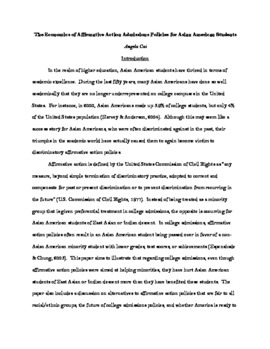| dc.contributor.advisor | Rath, Michael | |
| dc.contributor.author | Cai, Angela | |
| dc.date.accessioned | 2015-06-01T23:56:27Z | |
| dc.date.accessioned | 2015-08-24T19:53:28Z | |
| dc.date.accessioned | 2021-04-14T14:29:43Z | |
| dc.date.available | 2015-06-01T23:56:27Z | |
| dc.date.available | 2015-08-24T19:53:28Z | |
| dc.date.available | 2021-04-14T14:29:43Z | |
| dc.date.issued | 2015 | |
| dc.identifier.uri | https://hdl.handle.net/11244.46/32 | |
| dc.description.abstract | In the realm of higher education, Asian American students have thrived in terms of
academic excellence. During the last fifty years, many Asian Americans have done so well academically that they are no longer underrepresented on college campuses in the United States. For instance, in 2000, Asian Americans made up 5.9% of college students, but only 4% of the United States population (Harvey & Anderson, 2004). Although this may seem like a success story for Asian Americans, who were often discriminated against in the past, their triumphs in the academic world have actually caused them to again become victim to discriminatory affirmative action policies. | en_US |
| dc.description.abstract | Affirmative action is defined by the United States Commission of Civil Rights as “any measure, beyond simple termination of discriminatory practice, adopted to correct and compensate for past or present discrimination or to prevent discrimination from recurring in the future” (U.S. Commission of Civil Rights, 1977). Instead of being treated as a minority group that is given preferential treatment in college admissions, the opposite is occurring for Asian American students of East Asian or Indian descent. In college admissions, affirmative action policies often result in an Asian American student being passed over in favor of a non- Asian American minority student with lower grades, test scores, or achievements (Espenshade & Chung, 2005). This paper aims to illustrate that regarding college admissions, even though affirmative action policies were aimed at helping minorities, they have hurt Asian American students of East Asian or Indian descent more than they have benefited these students. The paper also includes a discussion on alternatives to affirmative action policies that are fair to all racial/ethnic groups, the future of college admissions policies, and whether America is ready to
eliminate affirmative action policies. | |
| dc.language | en_US | en_US |
| dc.rights | Copyright (c) 2015, The Honors Undergraduate Research Journal, The University of Oklahoma. All rights revert to authors. | |
| dc.rights.uri | https://creativecommons.org/licenses/by-nc-sa/4.0/ | |
| dc.subject | Undergraduate Research | en_US |
| dc.title | The Economics of Affirmative Action Admissions Policies for Asian American Students | en_US |
| dc.date.manuscript | 2015 | |
| ou.group | Joe C. and Carole Kerr McClendon Honors College | en_US |
| dc.description.undergraduate | undergraduate | |

